Grêmio Foot-Ball Porto Alegrense
Grêmio Foot-Ball Porto Alegrense (Portuguese pronunciation: [ˈɡɾemju futʃiˈbɔw ˌpoɾtw ɐleˈɡɾẽsi]), commonly known as Grêmio, is a Brazilian professional football club based in Porto Alegre, capital city of the Brazilian state of Rio Grande do Sul. The club plays in the Campeonato Brasileiro Série B, the second division of the Brazilian football league system, and the Campeonato Gaúcho, Rio Grande do Sul's top state league. The club was founded in 1903 by European immigrants Englishman Andy Fairbank and German Paul Cochlin. The club's home ground is the Arena do Grêmio, to which it moved in 2013, having previously played at Estádio Olímpico Monumental since 1954.
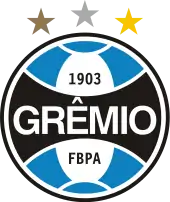 | ||||
| Full name | Grêmio Foot-Ball Porto Alegrense | |||
|---|---|---|---|---|
| Nickname(s) | Imortal Tricolor (Immortal Tricolor) Tricolor dos Pampas (Tricolor of the Pampas) Rei de Copas (King of Cups) Clube de Todos (Club of All) Maior do Sul (South's Greatest) | |||
| Founded | 15 September 1903 | |||
| Ground | Arena do Grêmio | |||
| Capacity | 55,225[1] | |||
| President | Romildo Bolzan Jr. | |||
| Head coach | Renato Portaluppi | |||
| League | Campeonato Brasileiro Série B Campeonato Gaúcho | |||
| 2021 2021 | Série A, 17th of 20 (relegated) Gauchão, 1st of 12 (champions) | |||
| Website | Club website | |||
| ||||
Grêmio also became Champions of the Intercontinental Cup, after beating Hamburger SV in 1983 (2–1).[2][3][4] Also, Grêmio is the Brazilian club that has won the most Copa CONMEBOL Libertadores de América (3) titles alongside São Paulo FC, Santos, and Palmeiras.[5]
As of 2017, Grêmio was ranked number one in the CBF club rankings[6] and is listed by Forbes as the third most valuable football club in the Americas with an estimated value of $295.5 million.[7] Grêmio has won 41 Campeonato Gaúcho, 2 Campeonato Brasileiro Série A, 1 Campeonato Brasileiro Série B, 1 Supercopa do Brasil, 1 Copa Sul and 5 Copa do Brasil. Internationally, Grêmio has won 1 Intercontinental Cup, 3 Copa Libertadores de América, 2 Recopa Sudamericana and 1 Sanwa Bank Cup.[8] Grêmio usually plays in a tricolor (blue, black and white) striped shirt, black shorts and white socks, which originated the team's nickname.
Grêmio has a fierce rivalry with Internacional, which is widely considered the most heated in Brazil[9][10] and one of the most heated in the world.[11][12] Matches between the two teams are known as Grenal.
History
The beginning and professionalism at the club
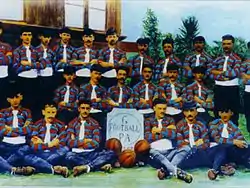
.png.webp)
On 7 September 1903, Brazil's first football team, Rio Grande, played an exhibition match in Porto Alegre. An entrepreneur from Sorocaba, São Paulo, named Cândido Dias was besotted with the sport and went to watch the match. During the match, the ball deflated. As the only owner of a football in Porto Alegre, he lent his ball to the players and the match resumed. After the match, he talked to the local players about how to start a football club. On 15 September 1903, 32 people, including Cândido Dias, met at Salão Grau, a local restaurant and founded "Grêmio Foot-Ball Porto Alegrense". Most of the founding members were part of the city's German community.[13] Carlos Luiz Bohrer was elected as first president.[14]
The club's first match took place on 6 March 1904, against Fuss Ball Porto Alegre, the first of two matches played that day. Grêmio won the first match 1–0. Unfortunately, the name of the player who scored the club's first goal is lost to history. The trophy Grêmio won that day, the Wanderpreis, is still displayed at the club's museum. Within 5 months the club had inaugurated the Baixada, its first home.
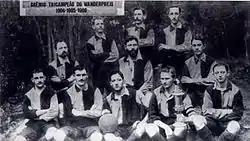
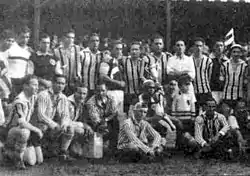
On 18 July 1909, Grêmio beat Internacional 10–0 on the latter's debut game. Grêmio's goalkeeper Kallfelz reportedly left the field to chat with fans during the match. Even now this victory is remembered with pride by Gremistas (Grêmio supporters). The match was the starting point for a rivalry that rages on to this day. Grêmio was one of the founding members of the Porto Alegre football league in 1910, and in 1911 won the league for the first time. On 25 August 1912, in a city league match, Grêmio beat Sport Clube Nacional of Porto Alegre 23–0. Sisson scored 14 goals in the match to record Grêmio's biggest ever win. In 1918, Grêmio became a founding member of the Fundação Rio-Grandense de Desportes (later known as Federação Gaúcha de Futebol), a federation that organized the first state championships in Rio Grande do Sul. The first championship was scheduled for 1918, but the Spanish flu epidemic forced the event to be postponed until 1919. In 1921, a year after the arrival of legendary goalkeeper Eurico Lara, Grêmio won its first state championship.
On 7 July 1911, Grêmio beat Uruguay's national team 2–1. In 1931, Grêmio became one of the first teams in Brazil to play matches at night after installing floodlights at Estádio Baixada. On 19 May 1935, Grêmio became the first team from Rio Grande do Sul to beat a team from the state of São Paulo (considered the strongest Brazilian league at the time) by defeating Santos 3–2. Grêmio was also the first club outside Rio de Janeiro state to play at the Maracanã Stadium, defeating Flamengo 3–1 in 1950.
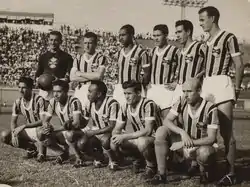
During this period, Grêmio started to earn a reputation abroad. In 1932 it played its first international match in Rivera (Uruguay). In 1949, the match against Uruguay's Nacional ended in a 3–1 win for Grêmio and the players received a hero's welcome on their return to Porto Alegre. In that same year, Grêmio played for the first time in Central America. Between 1953 and 1954, Grêmio travelled to Mexico, Ecuador and Colombia, a tour dubbed "the conquest of the Americas". On 25 February 1959, Grêmio defeated Boca Juniors 4–1 in Buenos Aires, becoming the first foreign team to beat Boca at La Bombonera.
In 1961, Grêmio went on its first European tour playing 24 games in 11 countries: France, Romania, Belgium, Greece, Germany, Poland, Bulgaria, Luxembourg, Denmark, Estonia and Russia. The Gremistas (Grêmio fans) were growing in number. 1946 saw the first appearance of the club's motto "com o Grêmio onde o Grêmio estiver" ("with Grêmio wherever Grêmio may be"), which was later written into Grêmio's official anthem. An anthem penned by Lupicinio Rodrigues, a samba-cancao composer who became one of the most famous and revered Grêmio fans. The anthem celebrates the Gremistas reputation for attending all Grêmio matches, regardless of the difficulties and obstacles they might have to overcome to see their club. In the late 1950s, Grêmio joined the Taça Brasil, as the Brazilian league was known at the time. The team reached the Taça Brasil semi-finals in 1959, 1963 and 1967. In 1968, the team won its first international title in a friendly cup with teams from Brazil and Uruguay. In 1954, Grêmio inaugurated what was at the time the biggest private stadium in Brazil, the Olímpico Stadium. In 1971, the Taça Brasil championship was replaced by the Campeonato Brasileiro with the first goal ever scored in the Campeonato Brasileiro coming from Grêmio's Néstor Scotta, an Argentine, in a match against São Paulo at Estádio do Morumbi.[15] Grêmio maintained a series of respectable results in Campeonato Brasileiro, usually achieving a top half finish.
Valdir Espinosa and the Intercontinental Cup 1983
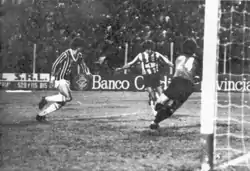
Grêmio's first dominant period in South American football began in the early 1980s. Propelled by the completion of their new stadium, the Olímpico Monumental.
Grêmio won its first Campeonato Brasileiro on 3 May 1981, after defeating São Paulo at the Morumbi Stadium in São Paulo. The scores in the two-leg final were 2–1 at Olímpico and 1–0 for Grêmio at Morumbi. The winning goal was scored by striker Baltazar. Earlier, on 26 April 1981 Olímpico had its biggest attendance ever, when 98,421 fans watched Grêmio lose to Ponte Preta 0–1 in the Campeonato Brasileiro semi-final.
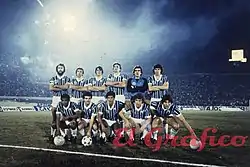
1983 was the most successful year in Grêmio's history. First, Grêmio won the South-American Copa Libertadores, after a consistent yet eventful campaign. One of the matches of the semi-final, the 3–3 draw against Estudiantes at Jorge Luis Hirschi Stadium, became legendary for its belligerence on and off the pitch and is dubbed the "Batalha de La Plata" ("Battle of La Plata").[16][17] In the finals, Grêmio beat the 1982 South America and World champions Peñarol from Uruguay, with a 1–1 draw in Montevideo and a 2–1 win in Porto Alegre. The winning goal was scored by César just before the end of the match. A year later, Grêmio was runner-up in the Copa Libertadores final, being defeated by Argentina's Independiente.
Also in 1983, Grêmio won the Intercontinental Cup after defeating Hamburger SV of Germany 2–1.[18] Renato Portaluppi scored both goals. With Uruguayan defender De León and goalkeeper Mazaropi also earning club legend status on the back of their performances in the Copa Libertadores and Intercontinental Cup. Porto Alegre, was deafened by the gremista's chant of: "The Earth is Blue". Soon after winning the Intercontinental Cup, Grêmio beat America of Mexico in Los Angeles, and won the Los Angeles Cup.
In 1989, Grêmio won the first Copa do Brasil, a Brazilian knockout cup featuring football teams from all around the country. After humiliating Flamengo with a 6–1 win in the second leg of the semi-finals, Grêmio defeated Sport Recife in the final, with a 0–0 draw in Recife and a 2–1 win in Porto Alegre.
In 1991, after a poor season, Grêmio was relegated for the first time to the Brazilian Second Division[19] but gained immediate promotion back to the Campeonato Brasileiro's elite the following season (1993). After this return to form, 1994 saw Grêmio win its second Copa do Brasil, defeating Ceará in the two-leg final (0–0 and 1–0), the solitary goal scored by striker Nildo. This win kickstarted the club's Tokyo Project. On December 11, 1994, Grêmio had to play three matches in a single day during the 1994 Campeonato Gaúcho, with kick-off times of 2PM, 4PM, and 6PM, due to their extensive schedule. They won two and drew the third match, using a total of 34 different players.[20]
Luiz Felipe Scolari and the Libertadores 1995
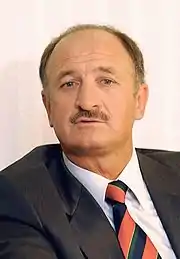
.jpg.webp)
In May 1995, under head coach Luiz Felipe Scolari, Grêmio were runners-up in the Copa do Brasil, losing the final match to Corinthians 0–1 at Olímpico Monumental. In August, a few days after beating arch-rivals Internacional for the state title with a reserve squad, the club won the Copa Libertadores for the second time. Defeating Atlético Nacional of Colombia 3–1 in Porto Alegre and drawing 1–1 in Medellín. The tournament was marked by fierce matches against Palmeiras in the quarter-finals. Palmeiras had perhaps the best squad on the competition, with players such as Rivaldo, Cafu, Edmundo, César Sampaio, Antônio Carlos, Roberto Carlos and Mancuso. They were soundly beaten by Grêmio in the 1st leg in an epic 5–0 match with a hat-trick from Mário Jardel. Palmeiras beat Grêmio 5–1 in the return leg, with Jardel's lone strike proving enough to see Grêmio through to the Semi-finals.
This qualified the club to the World Club tournament where Grêmio pushed a talented Ajax (Featuring Patrick Kluivert, Overmars, Van Der Sar and Kanu) into extra time and penalties despite being a player down. Early 1996 saw Grêmio win the Recopa Sudamericana, beating Argentina's Independiente 4–1.
On 15 December 1996, Grêmio won its second Campeonato Brasileiro, defeating Portuguesa in the final. Portuguesa won the first match at home 2–0, and therefore Grêmio was forced to win the final match at Porto Alegre by the same score or more. Grêmio got to 2–0, with midfielder Ailton scoring the second goal a few minutes before the final whistle. Grêmio won the title due to their higher finish in the league.
In 1997, Grêmio won their third Copa do Brasil title. In the finals against Romário's Flamengo, Grêmio won on away goals after a 0–0 draw in Porto Alegre and a 2–2 draw in Rio de Janeiro. Four years later, in 2001, Grêmio won their fourth Copa do Brasil, defeating Corinthians. The first leg of the final, in Porto Alegre, finished with the score of 2–2. The second game in São Paulo ended with a 3–1 Grêmio victory, in a match which is regarded as one of the finest in Grêmio's history.
Batalha dos Aflitos and the Libertadores 2007
.jpg.webp)
In 2004, after performing poorly for two consecutive seasons in the Série A, Grêmio finished bottom of the league and were relegated to Campeonato Brasileiro's Second Division.[21] Grêmio's promotion battle was difficult, with only two clubs able to qualify for promotion to the First Division. On 26 November 2005, at Estádio dos Aflitos, Recife, Grêmio had four players sent off and two penalty given kicks against them in a tumultuous match that has become known as "The Battle of the Aflitos" ("A Batalha dos Aflitos", "Aflitos" being the name of Náutico's home field).
Bruno Carvalho bounced the first penalty bounced off the post in the first half when Grêmio still had 11 players on the field; the second was saved by goalkeeper Galatto when had been reduced to 7 men. Within 72seconds of Galatto saving the penalty 17-year-old Anderson had made a run down the left flank to slot the ball into the back of the net to score Grêmio's winning goal. A goal that sealed the Série B championship and promotion to the Série A.
On 9 April 2006, at Estádio Beira-Rio, Grêmio won the state championship against Internacional, preventing them from winning a fifth title in a row. Playing away, Grêmio managed to obtain a 1–1 draw in the second leg of the final, enough to secure the title on away goals. Grêmio players said after the match that there were more than 50,000 Internacional fans in Beira Rio's Stadium and they could still hear the noise made by 6,000 Gremistas. In 2007, at Estádio Olímpico Monumental, Grêmio won the Campeonato Gaúcho once again this time against Juventude.
Also in 2007, Grêmio reached the final of the 2007 Copa Libertadores. Throughout the campaign the team overcame away losses by putting in heroic home performances and earning the moniker of Imortal Tricolor. This also pumped up the fans who even after a heavy 3–0 away defeat to Boca Juniors formed huge lines to buy tickets for the final game in Porto Alegre. with some of the fans queuing for four days or more. Unfortunately fan fervor wasn't enough with Riquelme's magnificent performance handing Boca Juniors a 2–0 win and the Copa Libertadores title.
Recent history and the Libertadores 2017
.jpg.webp)
.jpg.webp)
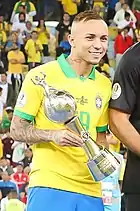
In 2008, after the sudden firing of their head coach Vagner Mancini, the club hired Celso Roth. Within a month they had prematurely dropped out of both the domestic cup (Copa do Brasil) and their state championship (Campeonato Gaúcho). This led to the team going through a state of crisis and, soon after, major renovation. They were expected to finish in the bottom half of the Campeonato Brasileiro but managed to finish in second place. For many supporters, even that was considered a failure as in the first half of the championship, the team was in fine form and even considered the best in the country. At the halfway point of the season the team had a 10-point lead over second place that they would eventually surrender in the final games of the season.
2012 marked the last year of the club's former stadium, Olímpico Monumental. Fan expectations were high but were not matched by the team's performance. Grêmio did, however, qualify for the Libertadores the following year.
In 2014, the club once again qualified for the Copa Libertadores de América and signed Enderson Moreira as the new manager.[22] However, after a successful campaign in the group stage, Grêmio failed in the competition and were eliminated by San Lorenzo in the Round of 16.[23] A few days before, the club was defeated 6–2 on aggregate by their biggest rival, the Internacional, in the finals of the Campeonato Gaúcho.[24] With nothing more than a regular campaign at the beginning of the Série A, club president Fábio Koff signed Luiz Felipe Scolari as the new coach of the team. The club also invested in Giuliano, the biggest hiring of the year.[25]
In 2015, former Grêmio player Roger Machado was hired as the new manager. A short lived but initially successful run, Machado's time with Grêmio saw them qualify for the 2016 Copa Libertadores with a finish in the Campeonato Brasileiro in 3rd place. Machado oversaw a famous victory over beat bitter rivals Internacional with a 5–0 drubbing in "Grenal" No. 407. Nonetheless, towards the end of the year, the team began to show a lack of organization, especially in its defensive system. As fan support dwindled, Roger announced his resignation after a 3–0 loss against Ponte Preta in September 2016. Renato Portaluppi replaced him and under his guidance a resurgent Grêmio became champions of the Copa do Brasil against Atlético Mineiro in a 4–2 aggregate score, making them the Brazilian club with the most titles in this tournament (5). After this historic feat, fans affectionately nicknamed Grêmio the "Rei de Copas" (King of Cups).
In 2017, Grêmio won their third Libertadores, after defeating Club Atlético Lanús 1–0 at Arena do Grêmio, followed by a 2–1 victory in Estadio Ciudad de Lanús. Luan was named the player of the tournament, while goalkeeper Marcelo Grohe performed spectacularly with a heroic, almost impossible save in the semi-final match against Barcelona Sporting Club. They became the third Brazilian club to win a third Copa Libertadores, after São Paulo and Santos.
The club went on to represent CONMEBOL at the 2017 FIFA Club World Cup, held in the United Arab Emirates. Grêmio beat Pachuca 1–0 in a tight semi-final, the goal coming from Everton in extra-time. They were beaten 0–1 by Real Madrid in the final.
2018 Season and Libertadores
Grêmio once again finished 4th in the 2018 Campeonato Brasileiro securing a place in the Copa Libertadores de América having been knocked out in the semi-final of the tournament on goal-difference in 2018 by a late River Plate goal to end the match 2–2. The goal was scored from a penalty, given on review of a handball by the VAR from Matheus Bressan in the 95th minute.[26] Bressan was subsequently transferred.[27] In the hours following the match it was revealed that River Plate manager Marcelo Gallardo had broken the rules of his touchline ban at half-time by entering the River dressing room. Grêmio appealed the result within 24 hours of the final whistle based on this information. It took CONMEBOL 2 days to deliberate, deciding that the result should stand, with Gallardo receiving a $50,000 fine and a 4-match suspension (1 from the Bombonera Stadium for the first leg of the Libertadores final against Boca Juniors and 3 subsequent touchline bans).[28] River Plate would go on to win the Copa Libertadores de América after further controversy.
Symbols
Stars
According to the club, the gold star represents the victory in the World Club Championship; the silver represents the three South American competition victories; and the bronze one represents the National competitions. There is also a gold star in Grêmio's flag that represents a player, Everaldo, the sole Grêmio player in the 1970 Brazilian World Cup winning team.
Flag
The first club flag was unveiled by the club during the opening ceremony for the Baixada stadium. At that time, it had a horizontal stripe of blue, black and white, with a medallion on the left top corner. The Brazilian Flag was the inspiration for the Tricolor's standard from 1918 to 1944.
Anthem
Grêmio's anthem is one of the most critically acclaimed in all of Brazilian football, other than the anthems of the clubs from Rio de Janeiro (all composed by Lamartine Babo), it is the only football anthem composed by a renowned composer, Lupicínio Rodrigues. Featuring a vivid melody in the style of a march, the anthem features the famous verses: Até a pé nós iremos / para o que der e vier / mas o certo é que nós estaremos / com o Grêmio onde o Grêmio estiver (Even on foot we will go / against all obstacles / but we sure will be / with Grêmio wherever Grêmio may be). Grêmio supporters boast that Grêmio, as the anthem hints, has never played without supporters anywhere in the world.
Eurico Lara, a goalkeeper who played for the club in the 1920s and in the 1930s, is mentioned in the anthem, where he is called the immortal idol (or craque imortal, in Portuguese).
Team kit
Grêmio tricolour scheme is made up of blue, black and white, an unusual colour combination for football shirts. The first Grêmio kit was inspired by English club Exeter City. At the time, the original kit included a black cap, striped shirt in blue and havana (a variation of brown), white tie, white shorts and black socks. Subsequently, the uniform was changed to blue and black due to the lack of havana fabric. Soon after, vertical white stripes were included in the kit creating a pattern that is used to the present day. The Grêmio colors are set in the club statute as so;
- Home colors – Vertical stripes of light blue and black, with white piping;
- Away colors – White with blue and black detail;
- Alternative colors – Dark Blue or blue with white details.
Sponsorship
| Product | Enterprise |
|---|---|
| Banking | |
| Sports equipment | |
| Health insurance | |
| Gambling | |
It was in the early 1980s that Grêmio received its first official sponsor, with the Brazilian Olympikus providing sports equipment. The partnership lasted until early 1983, when, on account of the brilliant moment that had been living in your history, the Grêmio has signed a contract with a German Adidas to supply. However, the partnership was short-lived, as in 1985, with the end of the contract with Adidas,a new supplier emerged, returning to the national level with Penalty. In 1987, for the first time in its history the Grêmio signed a sponsorship agreement for stamping the shirt, with Coca-Cola. This turn in their campaigns unprecedentedly exchanged their traditional red logo for black, because this color belongs to International, its biggest rival, and be vetoed at Grêmio.
Sponsorship of Penalty and Coca-Cola persisted with Grêmio for nearly a decade until, in 1995, the soft drink brand left the main sponsor of the shirts, which was assumed by Tintas Renner, until 1997. In 1998, General Motors assumed this position, exposing numerous names of vehicles throughout the partnership. At the beginning of the 21st century, Penalty left the club, with the Italian Kappa providing sports equipment.
In 2001, for the payment of debts, Grêmio closed an agreement with the state government of Rio Grande do Sul, exposing Banrisul banking mark on his shirt. However, after payment, it was Banrisul who assumed the payments and became the master sponsor of the club. In 2005 the contract with Kappa came to an end, after this, kits were the responsibility of another German in club history, Puma. Also from this era, Grêmio opened more spaces for smaller sponsors, with the first being Tramontina, Unimed, TIM and the return of Coca-Cola. In 2011, once again changing the supplier of sports equipment occurs, this time taking the Brazilian Topper, under the value of €4.8 million per season, which operates in the South American market, with a contract until the end of 2014. Beginning in 2015 season, the British company Umbro supplied sports equipment of Grêmio, paying the value of €6 million per year.[30]
Stadium
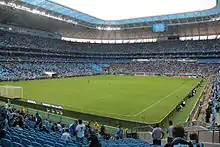
Grêmio's original stadium was the Estádio Olímpico Monumental, as it is called today. It was inaugurated on 19 September 1954 as Estádio Olímpico. At the time it was the largest private stadium in Brazil. Estádio Olímpico's first game was between Grêmio and Nacional from Uruguay; Grêmio won by a score of 2–0, with both goals scored by Vítor. In 1980 a second tier was added to the Olímpico, and the stadium was renamed the Olímpico Monumental. The first game at the renamed Olímpico Monumental was played on 21 June 1980, when Grêmio beat Vasco da Gama by a score of 1–0. Estádio Olímpico Monumental has an attendance record of 98,421 people for the game against Ponte Preta on 26 April 1981. Estádio Olímpico Monumental has 40 luxury booths which hold 10 people, and 5 booths which hold 20 people. It also has 140 places in a Tribune of Honor. It has 28 seats reserved for handicapped fans, 22 of which have space for people accompanying them. The Estádio Olímpico Monumental's Parking lot has space for 700 vehicles.
In 2012, Grêmio moved into their new stadium, Arena do Grêmio, a big multi-use stadium in Porto Alegre. Its capacity is 55,225 and is one of the most modern venues in South America.
Training centre
The first location for training used by Grêmio was the additional field built next door of Estádio Olímpico Monumental. However, it can not be exactly characterized as a training centre. In 2000 the construction of the first training centre of the club, the CT Hélio Dourado, in Eldorado do Sul, in the metropolitan region of Porto Alegre was completed, but, because of it being located quite far away, it ended up being used for club's Academy.
In 2014,the construction of the new training center of Grêmio, the CT Luiz Carvalho, located next to the Arena do Grêmio, in Porto Alegre was finished. It is adjacent to the Guaíba River, and has one of the most beautiful views of the city with the stadium and a cable-stayed bridge in the background.
Supporters
Grêmio has around 8 million fans in the country, meaning that, in terms of ranking, the club is the 6th most supporters in the Brazil. Grêmio associates 92,000 people.
Geral do Grêmio
The largest group of Grêmio supporters is Geral do Grêmio, the first and largest Brazilian barra brava,[31] movement similar to European ultras, but with unique characteristics of Latin America. The group was created during the year 2001 with Grêmio fans watching games from the seats behind the southern goal at Estádio Olímpico Monumental (an area of the stands called "Geral", as in "general", where tickets had lower costs). Over the following years, more people joined the movement, and they decided to collectively call themselves by the name of the area from where they watched the games. A unique and traditional feature of the crowd is running down the stand (a movement called the "avalanche"), pressing against the fence when a goal is scored as a way to also embrace the players in celebration.
Being a barra brava, the Geral do Grêmio has differences with the ultras. On games they bring a band consisting of percussion and blowing instruments, dictating the rhythm of the chants throughout the game, never stopping or sitting. Banners and flags are exhibited in the length of the sector in which they are located inside the stadium, bringing a unique identity to their supporters. Also, wherever possible, they use flare, smoke bombs, fire extinguishers, among other materials to encourage the team on the field. In the Arena do Grêmio, which opened in December 2012, the lower northern stand was built with no chairs, with the Geral crowd and its "avalanche" celebration in mind. Later the avalanche celebration was made impossible by the addition of security metal bars.
Rivalries
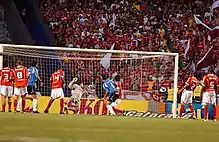
As the years went on, Grêmio and another important Brazilian football club, Internacional, started to form a rivalry. Soon the games between these two clubs got their own name, Grenal, and resulted in record attendance. Now the games fill the streets of Porto Alegre with football-crazed fans.
In 1935, Eurico Lara, who was Grêmio's goalie, conceded a penalty kick. When the Internacional player was about to kick it, Lara's brother stopped the game and reminded him of his doctor's recommendation that he didn't overexert himself. He didn't listen. Soon the Internacional player took the shot. Lara caught it, but as soon as he did he fell sideways and didn't move. He was substituted after the wondrous save, and Grêmio won the game. But unfortunately he died two months later as a result of the fatigue from that game. Lara has been immortalized in the club anthem.
Players
First team squad
- As of 30 September 2022.[32]
Note: Flags indicate national team as defined under FIFA eligibility rules. Players may hold more than one non-FIFA nationality.
|
|
For recent transfers, see 2022 Grêmio F.B.P.A. Transfers.
Other players under contract
Note: Flags indicate national team as defined under FIFA eligibility rules. Players may hold more than one non-FIFA nationality.
|
Reserves squad
Note: Flags indicate national team as defined under FIFA eligibility rules. Players may hold more than one non-FIFA nationality.
|
|
Out on loan
Note: Flags indicate national team as defined under FIFA eligibility rules. Players may hold more than one non-FIFA nationality.
|
|
Club officials
Last updated: 1 September 2022.
Source: Grêmio Foot-Ball Porto Alegrense - Site Oficial
|
|
|
|
Managerial history
| Date | Coach | Titles |
|---|---|---|
| 1903–20 | 1911, 1912, 1914, 1915, 1919, 1920 Campeonato Citadino de Porto Alegre | |
| 1920–31 | 1921, 1922 Campeonato Gaúcho 1920, 1921, 1922, 1923, 1925, 1926, 1930, 1931 Campeonato Citadino de Porto Alegre | |
| 1931–44 | 1931, 1932 Campeonato Gaúcho 1931, 1932, 1933, 1935, 1937, 1938, 1939 Campeonato Citadino de Porto Alegre | |
| 1945 | Unknown | |
| 1946–49 | 1946, 1949 Campeonato Gaúcho 1946, 1949 Campeonato Citadino de Porto Alegre | |
| 1950–53 | Unknown | |
| 1954 | ||
| 1955–61 | 1956, 1957, 1958, 1959, 1960 Campeonato Gaúcho 1956, 1957, 1958, 1959, 1960 Campeonato Citadino de Porto Alegre | |
| 1961–62 | 1962 Campeonato Sul-Brasileiro 1962 Campeonato Gaúcho | |
| 1962–63 | 1963 Campeonato Gaúcho | |
| 1964–65 | 1964, 1965 Campeonato Gaúcho | |
| 1966 | 1966 Campeonato Gaúcho | |
| 1967 | 1967 Campeonato Gaúcho | |
| 1968–69 | 1968 Campeonato Gaúcho | |
| 1970 | ||
| 1971 | ||
| 1972 | ||
| 1973 | ||
| 1974 | ||
| 1975 | ||
| 1976 | ||
| 1976 | ||
| 1977–78 | 1977 Campeonato Gaúcho | |
| 1979 | 1979 Campeonato Gaúcho | |
| 1980 | 1980 Campeonato Gaúcho | |
| 1980 | ||
| 1981–82 | 1981 Campeonato Brasileiro Série A | |
| 1983 | 1983 Copa Libertadores 1983 Intercontinental Cup | |
| 1984 | ||
| 1984 | ||
| 1985 | 1985 Campeonato Gaúcho | |
| 1986 | 1986 Campeonato Gaúcho | |
| 1987 | ||
| 1987 | 1987 Campeonato Gaúcho | |
| 1988 | 1988 Campeonato Gaúcho | |
| 1989 | ||
| 1989 | 1989 Copa do Brasil 1989 Campeonato Gaúcho | |
| 1990 | ||
| 1990 | 1990 Supercopa do Brasil 1990 Campeonato Gaúcho | |
| 1991 | ||
| 1991 | ||
| 1992 | ||
| 1992 | ||
| 1993 | ||
| 1993 | 1993 Campeonato Gaúcho | |
| 1993–96 | 1994 Copa do Brasil 1995 Sanwa Bank Cup 1995 Copa Libertadores 1995, 1996 Campeonato Gaúcho 1996 Recopa Sudamericana 1996 Campeonato Brasileiro Série A | |
| 1997 | 1997 Copa do Brasil | |
| 1997 | ||
| 1997–98 | ||
| 1998 | ||
| 1998–99 | 1999 Copa Sul 1999 Campeonato Gaúcho | |
| 1999 | ||
| 2000 | ||
| 2000 | ||
| 2000 | ||
| 2001–03 | 2001 Copa do Brasil 2001 Campeonato Gaúcho | |
| 2003 | ||
| 2003 | ||
| 2003–04 | ||
| 2004 | ||
| 2004 | ||
| 2004 | ||
| 2005 | ||
| 2005–07 | 2005 Campeonato Brasileiro Série B 2006, 2007 Campeonato Gaúcho | |
| 2006 | 2006 Copa FGF (Grêmio B) | |
| 2008 | ||
| 2008–09 | ||
| 2009 | ||
| 2010 | 2010 Taça Fernando Carvalho 2010 Campeonato Gaúcho | |
| 2010–11 | 2011 Taça Piratini | |
| 2011 | ||
| 2011 | ||
| 2012 | ||
| 2012–13 | ||
| 2013 | ||
| 2014 | ||
| 2014–15 | ||
| 2015–16 | ||
| 2016–21 | 2016 Copa do Brasil 2017 Copa Libertadores 2018 Recopa Sudamericana 2018, 2019, 2020 Campeonato Gaúcho 2019 Recopa Gaúcha | |
| 2021 | 2021 Campeonato Gaúcho 2021 Recopa Gaúcha | |
| 2021 | ||
| 2021–22 | ||
| 2022 | 2022 Campeonato Gaúcho 2022 Recopa Gaúcha | |
| 2022– |
Honours
Professional
| Type | Competition | Titles | Seasons | Runners-up |
|---|---|---|---|---|
| Worldwide | Intercontinental Cup* | 1 | 1983 | 1995 |
| FIFA Club World Cup* | 0 | 2017 | ||
| Intercontinental | Sanwa Bank Cup* | 1 | 1995 | |
| Continental | Copa CONMEBOL Libertadores de América | 3 | 1983, 1995, 2017 | 1984, 2007 |
| CONMEBOL Recopa Sudamericana | 2 | 1996, 2018 | ||
| National | Campeonato Brasileiro Série A | 2 | 1981, 1996 | 1982, 2008, 2013 |
| Copa do Brasil | 5 | 1989, 1994, 1997, 2001, 2016 | 1991, 1993, 1995, 2020 | |
| Supercopa do Brasil | 1 | 1990 | ||
| Campeonato Brasileiro Série B | 1 | 2005 | ||
| Regional | Copa Sul | 1 | 1999 | |
| Campeonato Gaúcho | 41 | 1921, 1922, 1926, 1931, 1932, 1946, 1949, 1956, 1957, 1958, 1959, 1960, 1962, 1963, 1964, 1965, 1966, 1967, 1968, 1977, 1979, 1980, 1985, 1986, 1987, 1988, 1989, 1990, 1993, 1995, 1996, 1999, 2001, 2006, 2007, 2010, 2018, 2019, 2020, 2021, 2022 | 1919, 1920, 1925, 1930, 1933, 1935, 1961, 1969, 1970, 1971, 1972, 1973, 1974, 1975, 1976, 1978, 1981, 1982, 1984, 1991, 1992, 1997, 2000, 2009, 2011, 2014, 2015 | |
| Other | Copa FGF | 1 | 2006 | |
| Recopa Gaúcha | 3 | 2019, 2021, 2022 | 2020 | |
| Campeonato Sul-Brasileiro | 1 | 1962 | ||
| Campeonato da Região Sul-Fronteira | 0 | 2014 | ||
| Taça Fernando Carvalho | 1 | 2010 | ||
| Taça Piratini | 2S | 2010, 2011 | 2009 | |
| Taça Farroupilha | 0 | 2011, 2012 | ||
| Copa 100 Anos do Gauchão | 1 | 2019 | ||
| Taça Francisco Novelletto Neto | 1 | 2020 | ||
| Campeonato Citadino de Porto Alegre | 29 | 1911, 1912, 1913, 1914, 1915, 1919, 1920, 1921, 1922, 1923, 1925, 1926, 1930, 1931, 1932, 1933, 1935, 1937, 1938, 1939, 1946, 1949, 1956, 1957, 1958, 1959, 1960, 1964, 1965 | 1910, 1918, 1943, 1948, 1950, 1953, 1955, 1972 | |
- record
- S shared record
Note (1): Although the Intercontinental Cup and the FIFA Club World Cup are officially different tournaments, in Brazil they are often treated as the same tournament.
Note (2): Sanwa Bank Cup was a precursor tournament to the Suruga Bank Championship but is not considered official.
International
- Troféu Fronteira da Paz (URU) (1): 2010
- Taça Hang Ching (CHN) (1): 1998
- Pepsi Cola Cup (CHN) (1): 1998
- Troféu Colombino (SPA) (1): 1997
- Troféu Agrupación Peñas Valencianas (SPA) (1): 1996
- Copa Renner (1): 1996
- Philips Cup (SWI) (1): 1987
- Philips Cup (NED) (1): 1986
- Rotterdam AD-Tournament (NED) (1): 1985
- Troféu Ciudad de Palma de Mallorca (SPA) (1): 1985
- Troféu 'CEL' (SLV) (1): 1983
- Los Angeles Cup (USA) (1): 1983
- Troféu Ciudad de Valladolid (SPA) (1): 1981
- Troféu Torre del Vigia (URU) (1): 1981
- Copa El Salvador del Mundo (SLV) (1): 1981
- Troféu Ciudad de Rosário (ARG) (1): 1979
- Taça Cidade de Salvador (BRA) (1): 1972
- Taça do Atlântico (1): 1971
- Copa Internacional de Porto Alegre (BRA) (1): 1971
- Taça Río de La Plata (1): 1968
- Troféu Internacional de Salônica (GRE) (1): 1962
- Troféu Internacional de Atenas (GRE) (1): 1961
- Copa José González Artigas (ECU) (1): 1954
- Troféu Sadrep (URU) (1): 1949
- Copa El President de la Republica de Costa Rica (CRC) (1): 1949
National
- Troféu João Saldanha (1): 2010
- Troféu Osmar Santos (1): 2008
- Taça Ironcryl (1): 1997
- Taça Presidente Médici (1): 1971
- Troféu Domingos Garcia Filho (1): 1970
- Taça Petrobrás (1): 1970
- Copa Tancredo Neves (1): 1960
- Copa Revista do Esporte (1): 1960
- Taça Correio do Povo (1): 1949
- Taça Columbia Pictures (1): 1940
- Taça General Flores da Cunha (1): 1935
Regional
- Troféu Rádio Gaúcha 90 Anos (RS) (1): 2017
- Troféu Rádio Bandeirantes 80 Anos (RS) (1): 2014
- Taça Rádio Pelotense 85 Anos (RS) (1): 2010
- Copa Solidariedade (RS) (1): 1995
- Taça RBS TV 25 Anos (RS) (1): 1988
- Troféu Sesquicentenário da Revolução Farroupilha (RS) (1): 1985
- Torneio 'Festa da Uva' (RS) (1): 1965
- Torneio Início Estadual (RS) (3): 1963, 1965, 1967
- Troféu Wallig (RS) (1): 1962
- Taça Jubileu de Prata da Refinaria Ipiranga (RS) (1): 1962
- Copa Farroupilha 120 Anos (1): 1955
- Taça Bento Gonçalves (1): 1952
- Taça Rádio Gaúcha (1): 1952
- Taça Manuel Amorim Albuquerque (1): 1950
- Campeonato Extra de Porto Alegre (2): 1948, 1949
- Taça Cidade de Porto Alegre (2): 1948, 1996
- Taça General Corrêa Lima (1): 1946
- Taça Casa Sport (1): 1946
- Taça 'Dia do Futebol' (1): 1945
- Taça Ernesto Dorneles (1): 1943
- Taça Cambial (2): 1942, 1943
- Campeonato Gaúcho de Amadores (1): 1942
- Campeonato Metropolitano de Amadores (1): 1942
- Taça de Portugal (1): 1940
- Taça José Loureiro da Silva (1): 1938
- Taça 'Dia do Filiado' (1): 1938
- Taça Café Nacional (1): 1938
- Taça Martel (2): 1936, 1937
- Torneio 'Benefício da FRGD'(1): 1935
- Taça Flores da Cunha 1): 1934
- Taça 'Dia do Cronista' (7): 1933, 1944, 1956, 1960, 1961, 1962, 1968
- Taça 'Dia do Desporto' (1): 1932
- Torneio de Encerramento de Porto Alegre (3): 1931, 1933, 1938
- Torneio de Preparação de Porto Alegre (1): 1929
- Taça Reivindicação (1): 1929
- Taça Fernando Caldas (1): 1928
- Torneio Washington Luis (1): 1926
- Torneio FC Porto Alegre (1): 1926
- Taça São Pedro (1): 1924
- Taça Associação dos Varejistas (2): 1923, 1924
- Torneio Início de Porto Alegre (14): 1922, 1926, 1927, 1931, 1937, 1939, 1946, 1947, 1948, 1949, 1958, 1963, 1965, 1967
- Taça Rio Branco (3): 1914, 1915, 1916
- Taça Sportiva (1): 1909
- Troféu Wanderpreis (8): 1904, 1905*, 1905*, 1906, 1907, 1910, 1911, 1912
Woman
- Copa Sul (1): 2002
- Campeonato Gaúcho de Futebol Feminino (3): 2000, 2001, 2018
- Copa de Inverno de Gramado (RS) (1): 1998
- Copa 90 Anos do EC Pelotas (1): 1998
Futsal
- Copa Atlântico Sul (1): 1987
- Taça Governador do Estado (RS) (1): 1976
- Campeonato Metropolitano (2): 1973, 1974
Football 7
- Liga das Américas (1): 2020
- Campeonato Gaúcho (1): 2020
- Taça Governador (1): 2020
Basketball
- Campeonato Gaúcho (3): 1934, 1954, 1955
Volleyball
- Campeonato Gaúcho (2): 1929, 1934
- Campeonato Citadino (6): 1930, 1931, 1932, 1933, 1934, 1935
Tennis
- Campeonato Gaúcho (1): 1926
Table Tennis
- Campeonato Citadino (1): 1949
Boxing
- Campeonato Gaúcho (3): 1949, 1950, 1951
Sport of Athletics
- Troféu Brasil de Atletismo (2): 1958, 1959
- Campeonato Gaúcho de Atletismo Masculino (16): 1934, 1935, 1936, 1956, 1957, 1958, 1959, 1960, 1961, 1962, 1963, 1964, 1965, 1966, 1967, 1968
- Campeonato Gaúcho de Atletismo Feminino (8): 1951, 1953, 1959, 1960, 1961, 1965, 1966, 1972
Campeonato Brasileiro record
| Year | Position | Year | Position | Year | Position | Year | Position | Year | Position | Year | Position |
|---|---|---|---|---|---|---|---|---|---|---|---|
| 1971 | 6th | 1981 | 1st | 1991 | 19th | 2001 | 5th | 2011 | 12th | 2021 | 17th |
| 1972 | 10th | 1982 | 2nd | 1992 | Série B | 2002 | 3rd | 2012 | 3rd | 2022 | Série B |
| 1973 | 5th | 1983 | 14th | 1993 | 11th | 2003 | 20th | 2013 | 2nd | ||
| 1974 | 5th | 1984 | 3rd | 1994 | 11th | 2004 | 24th | 2014 | 7th | ||
| 1975 | 14th | 1985 | 18th | 1995 | 15th | 2005 | Série B | 2015 | 3rd | ||
| 1976 | 6th | 1986 | 16th | 1996 | 1st | 2006 | 3rd | 2016 | 9th | ||
| 1977 | 13th | 1987 | 5th | 1997 | 14th | 2007 | 6th | 2017 | 4th | ||
| 1978 | 6th | 1988 | 4th | 1998 | 8th | 2008 | 2nd | 2018 | 4th | ||
| 1979 | 22nd | 1989 | 11th | 1999 | 18th | 2009 | 8th | 2019 | 4th | ||
| 1980 | 6th | 1990 | 3rd | 2000 | 4th | 2010 | 4th | 2020 | 6th | ||
References
Websites
- "Arena do Grêmio official capacity". SkyScraper City.
- "1983 FIFA CLUB WORLD CHAMPIONSHIP HAMBURG v. GREMIO".
- "90min.in".
- "Fifa reconhece títulos mundiais de Flamengo, Grêmio, Santos e São Paulo".
- "Copa Libertadores - Champions".
- "Ranking da CBF atualizado: Grêmio é o novo líder". Confederação Brasileira de Futebol. Archived from the original on 20 May 2017. Retrieved 29 August 2016.
- "Los 50 equipos más valiosos de América". Forbes Mexico. 29 September 2017. Retrieved 3 October 2017.
- "Portal Oficial do Grêmio FootBall Porto Alegrense – Títulos Internacionais". Portal Oficial do Grêmio Foot-Ball Porto Alegrense. Archived from the original on 15 January 2013. Retrieved 21 July 2015.
- "Ranking: com mesmo número de votos por estado, elegemos os 30 maiores clássicos do Brasil". Globo Esporte. Retrieved 31 August 2017.
- "Qual é o maior clássico do mundo? E o maior brasileiro?". ESPN Brasil. Retrieved 31 August 2017.
- "FourFourTwo's 50 Biggest Derbies in the World, No.8: Gremio vs Internacional". Four Four Two. 29 April 2016. Retrieved 31 August 2017.
- "The top 50 football derbies in the world 10–1: Who gets the top spot as we conclude our countdown?". Daily Mirror. 13 October 2017. Retrieved 13 October 2017.
- "Alemanha e futebol: uma relação antiga com Porto Alegre e o RS - Portal do Estado do Rio Grande do Sul". www.rs.gov.br. Archived from the original on 22 November 2016.
- "Portal Oficial do Grêmio FootBall Porto Alegrense – História". Portal Oficial do Grêmio Foot-Ball Porto Alegrense. Archived from the original on 3 February 2009. Retrieved 21 July 2015.
- "Portal Oficial do Grêmio FootBall Porto Alegrense – Curiosidades". Portal Oficial do Grêmio Foot-Ball Porto Alegrense. Archived from the original on 21 July 2011. Retrieved 21 July 2015.
- Estudiantes vs. Gremio: la batalla épica de 1983 on 0221.com
- 30 años de una de las hazañas más notables de Estudiantes on TN, 8 July 2013
- "Site Oficial da FIFA diz que Grêmio ganhou a Copa Toyota em 1983" [Official FIFA website says Grêmio won the Toyota Cup in 1983] (in Portuguese). RBS. 2 July 2014.
- Leonardo de Escudeiro (5 December 2014). "Grêmio foi do 3º lugar em 1990 ao rebaixamento em 1991, e é difícil explicar por que" (in Portuguese). Terra.
- Rizzatti, Lucas (1 December 2012). "A rodada surreal: quando o Olímpico recebeu três jogos na mesma tarde" [The surreal round: when the Olympic received three games in the same afternoon]. Rede Globo (in Portuguese).
- "No aniversário da Batalha dos Aflitos, Náutico frustra torcida e continua na Série B" (in Portuguese). 26 November 2016.
- "Grêmio anuncia Enderson Moreira como novo treinador para 2014". Terra Esportes.
- "Grêmio perde para San Lorenzo nos pênaltis e é eliminado nas oitavas". Globo Esporte.
- "Inter goleia o Grêmio em Gre-Nal no Centenário e fatura o tetra no Gauchão". Zero Hora. 13 April 2014.
- "Grêmio oficializa a contratação de Giuliano". Portal Oficial do Grêmio. Archived from the original on 14 July 2014. Retrieved 4 September 2014.
- "River Plate beats Gremio to reach Copa Libertadores final". Fox Sports.
- "FC Dallas Signs Brazilian Defender Bressan". MLS.
- "CONMEBOL reject Gremio's Copa Libertadores appeal, fine River Plate manager Marcelo Gallardo". ESPN. 4 November 2018.
- História do Grêmio Foot-Ball Porto Alegrense Archived 8 September 2017 at the Wayback Machine on Futebol Porto-Alegrense website
- "Umbro abriu a carteira para acertar com o Grêmio". Zero Hora.
- "A Torcida". Geral do Grêmio.
- "Elenco Profissional". Grêmio Foot-Ball Porto Alegrense - Site Oficial. 29 April 2021.
Books
- Enciclopédia do Futebol Brasileiro, Volume 1 – Lance, Rio de Janeiro: Aretê Editorial S/A, 2001.
- Especial Placar – 500 Times do Brasil, São Paulo: Editora Abril: 2003.
External links
- Official website

- Geral do Grêmio official website. Geral do Grêmio.
- Unofficial media website. Ducker.com.br.
- Coleção Grêmio Gianfranco. The best online collection of Grêmio memorabilia; organized by Gianfranco Spolaore.